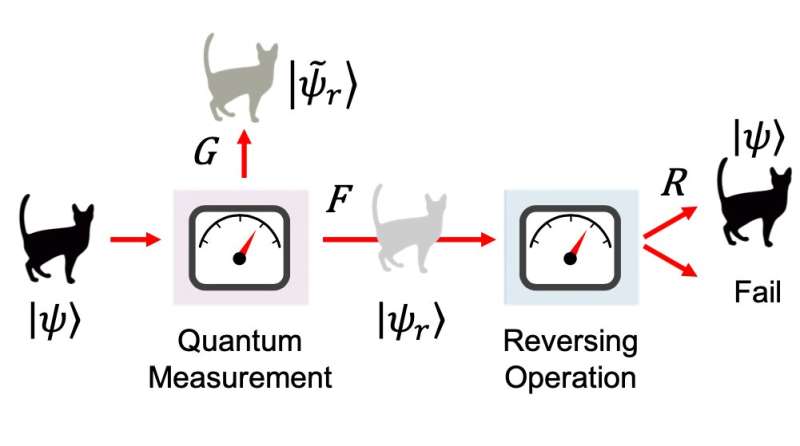February 23, 2022 feature
Study redefines what information is important in quantum measurements

Researchers at Korea Institute of Science and Technology (KIST) have recently tried to capture the interplay between different types of information that are important while collecting quantum measurements, namely information gain, disturbance and reversibility. Their paper, published in Physical Review Letters, represents these three key quantities related to quantum measurement in a single trade-off relation, for the very first time.
"The concept of the trade-off between the information gain and the disturbance was known before (i.e., if we want to gain some information about a quantum state or system we inevitably disturb the state or the system and it transforms to some other state in the process)," Seung-Woo Lee and Hyang-Tag Lim at the KIST Center for Quantum Information, told Phys.org. "The concept of reversibility was also investigated before, however, not in conjunction with the information gain and disturbance."
Information gain, disturbance and reversibility are three crucial quantities impacting quantum measurement procedures. The key objective of the recent work by Lee, Lim and their colleagues was to show that there is a trade-off relation between all these three quantities.
To achieve this, the team built an interferometer, an optical device that merges two or more sources of light together to create an interference pattern that can then be measured and analyzed. The interferometer they created has three optical paths and can couple photonic qutrits (i.e., units of quantum information) with path degrees of freedom.

"In quantum optics, one can generate and manipulate a photonic qudit state using various single photon's degrees of freedom such as polarization, time-bin, optical path, orbital angular momentum, and so on," Lim explained. "Using our interferometer, we collected different types of quantum measurements, by adjusting the transmission amplitude for each path. The transmission amplitude for each path was controlled using linear optical devices, such as half waveplates and polarizing beam splitters."
Based on the measurements they collected, Lim and his colleagues were then able to estimate three types of information content and demonstrate a complete information trade-off, by manipulating a photonic qutrit state and the strengths of quantum measurement. Their findings show that quantum measurements split the information of a quantum state into three different parts, namely the information gain, disturbance and reversibility.
"The main contribution of our work is that it brought these three concepts under one roof for the first time, showing a single trade-off relation containing all three elements," Lee said. "We showed that the three quantities are interlinked and dependent on each other. Our study redefines what quantities are important for a quantum measurement and what should be their values for a measurement in a quantum information task to be optimal."
The findings gathered by this team of researchers could have numerous important implications, as they clearly delineate the most important quantities for preserving information while collecting quantum measurements. In addition to inspiring new quantum research studies, this work could also pave the way for the development of more secure quantum information processing tools.
"There can be many new research directions we could pursue now," Lee added. "The first is to analyze similar trade-off relations in multi-particle systems in presence or absence of entanglement and other forms of correlations. Another is to capture the concept of information loss in the framework of trade-off relation involving the three quantities, in presence and absence of noise. Finally, we plan to try linking this framework to the models of decoherence and analyze how information loss scales with decoherence when studied in the context of this trade-off relation."
More information: Seongjin Hong et al, Demonstration of Complete Information Trade-Off in Quantum Measurement, Physical Review Letters (2022). DOI: 10.1103/PhysRevLett.128.050401
Journal information: Physical Review Letters
© 2022 Science X Network




















